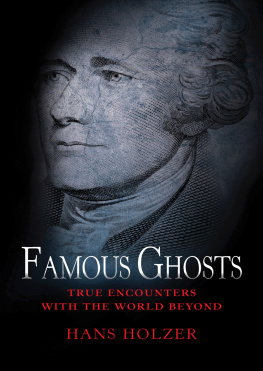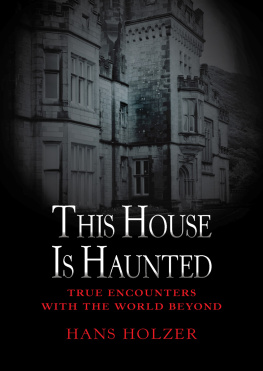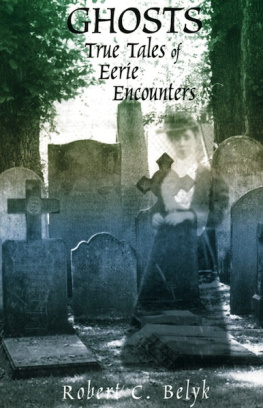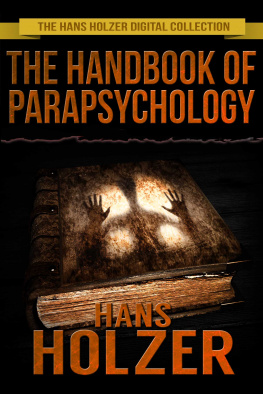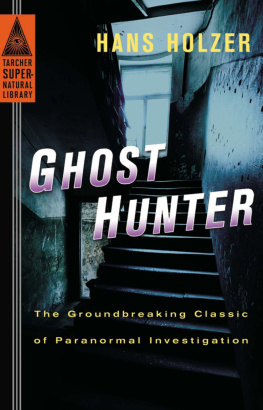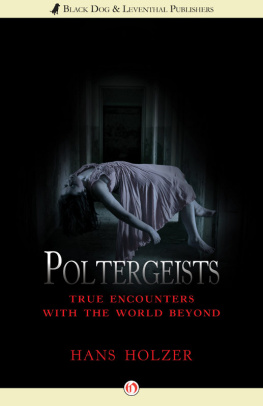FAMOUS GHOSTS
TRUE ENCOUNTERS WITH WORLD BEYOND
HANS HOLZER
By the author of Witches and Hans Holzers Travel Guide to Haunted Houses


HANS HOLZER IS THE AUTHOR of 119 books, including Life Beyond, The Directory of Psychics, Americas Mysterious Places, Windows to the Past, and Witches.
He has written, produced, and hosted a number of television programs, notably Ghost in the House, Beyond the Five Senses, and the NBC series In Search of He has appeared on numerous national television programs and lectured widely. He has written for national magazines such as Mademoiselle, Penthouse, Longevity, and columns in national weeklies.
Hans Holzer studied at Vienna University, Austria; Columbia University, New York; and holds a Ph.D. from the London College of Applied Science. Professor Holzer taught parapsychology for eight years at the New York Institute of Technology, is a member of the Authors Guild, Writers Guild of America, Dramatists Guild, the New York Academy of Science, and the Archaeological Institute of America. He is listed in Whos Who in America and lives in New York City.
Introduction
As we settle more securely into the new millennium, peoples interests in the cosmic continue to grow. Even ordinary Joes and Janes who normally wouldnt be caught dead reading an astrology column are suddenly wondering what the second millennium will mean for them and this world of ours.
To begin with, the millennium came and went over a decade ago. Jesus was born not the the year zero but in 7 B.C., on October 9, to be exact, as I proved quite a while ago after fifteen years of archeological research. This business of the millennium was strictly hype, a promotion that was created to make people think something very special would happen in the year 2000. The psychological effects of this millennium, however, are already upon uscasting a shadow in terms of a renewed great interest in things paranormal, for instance.
Several new TV talk shows and documentaries dealing with psychic phenomena and the exploration of the frontiers of human consciousness have sprung up, filling the television screens with tabloid tidbits often lacking in depth and validating research. Fictional forays into worlds beyond are also currently hugely successful both in film and television, and in books and even Websites.
As a purveyor of genuine information regarding psychic phenomena, I welcome this resurgence of curiosity in worlds beyond the physical because contemplating these matters tends to make people think about themselves, their ultimate fate, and the nature of humankind itself.
When it comes to dealing with the hard evidence of life after death, there are three classes of peopleand this may remain the case for a long time to come, considering how resistant humans are to embracing radically new or different concepts.
There are those who ridicule the idea of anything beyond the grave. This category includes anybody from hard-line scientists to people who are only comfortable with the familiar, material world and really do not wish to examine any evidence that might change their minds. The will to disbelieve is far stronger than the will to believethough neither leads to proof and hard evidence.
Then there are those who have already accepted the evidence of a continued existence beyond physical death, including people who have arrived at this conclusion through an examination of hard evidence, either personal in nature or from scientifically valid sources. They are the group I respect the most, because they are not blind believers. They rightfully question the evidence, but they have no problem accepting it when it is valid. Included in this group are the religious-metaphysical folks, although they require no hard proof to validate their convictions, which emanate from a belief system that involves a world beyond this one.
The third group is often thrown offtrack when trying to get at the truth by the folks in the metaphysical camp. This makes it more difficult for them to arrive at a proper conviction regarding the psychic. The thing for this third group is to stick to its principles and not become blind believers.
The vast majority of people belong to the third group. They are aware of the existence of psychical phenomena and the evidence for such phenomena, including case histories and scientific investigations by open-minded individuals. But they may be skeptical. They hesitate to join the second group only because of their own inner resistance to such fundamental changes in their philosophical attitudes toward life and death. For them, therefore, the need to be specific when presenting evidence or case histories, which must be fully verifiable, is paramount, as is an acceptable explanation for their occurrence.
It is hoped that those in the second group will embrace the position of the last group: that there are no boundaries around possibilities, provided that the evidence bears it out.
Prof. Hans Holzer, Ph.D.
Famous Ghosts
HERE WE DEAL WITH the ghosts of famous people, whose names nearly everyone will recognize. This category includes historical celebrities, national figures, heroes, leaders, and also celebrities of Hollywood, the theatre, people who once made headlines, and people who had some measure of fame, which is usually a lot more than the proverbial fifteen minutes that, according to the late Andy Warhol, everyone can find.
There are many houses or places where famous ghosts have appeared that are open to the public. These include national monuments, local museums, historical houses and mansions. But are the famous ghosts still there when you visit? Well, now, that depends: many ghostly experiences are, as I have pointed out, impressions from the past, and you get to sort of relive the events that involved them in the past. It is a little difficult to sort this out, tell which is a bona fide resident ghost still hanging around the old premises and which is a scene from the past. But if you are the one who is doing the exploring, the ghost hunter as it were, it is for you to experience and decide for yourself. Good hunting!
GHOSTS IN FICTION
Ghosts, phantoms and spirits have always been a staple for novelists and dramatists. Mysterious and worrisome ghosts are both part of the human experience yet outside the mainstream of that world. Many of the false notions people have about ghosts come from fiction. Only in fictional ghost stories do ghosts threaten or cause harm: in the real afterlife, they are too busy trying to understand their situation to worry about those in the physical world.
From Chaucers Canterville ghost with his rattling chain to Shakespeares ghost of Hamlets father, who restlessly walked the ramparts of his castle because of unresolved matters (such as his murder), in literature, ghosts seem frightening and undesirable. No Caspers there.
The masters of the macabre, from E. T. A. Hoffman to Edgar Allan Poe, have presented their ghosts as sorrowful, unfortunate creatures who are best avoided.

